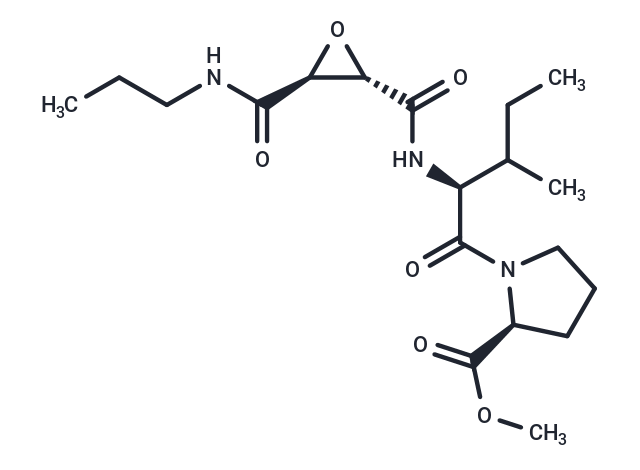Shopping Cart
- Remove All
 Your shopping cart is currently empty
Your shopping cart is currently empty

CA-074 methyl ester (Cathepsin B Inhibitor IV) is a specific inhibitor of Cathepsin B with neuroprotective, anti-cancer, and anti-inflammatory effects.

| Pack Size | Price | Availability | Quantity |
|---|---|---|---|
| 1 mg | $54 | In Stock | |
| 2 mg | $72 | In Stock | |
| 5 mg | $117 | In Stock | |
| 10 mg | $198 | In Stock | |
| 25 mg | $397 | In Stock | |
| 50 mg | $589 | In Stock | |
| 100 mg | $843 | In Stock | |
| 1 mL x 10 mM (in DMSO) | $97 | In Stock |
| Description | CA-074 methyl ester (Cathepsin B Inhibitor IV) is a specific inhibitor of Cathepsin B with neuroprotective, anti-cancer, and anti-inflammatory effects. |
| In vitro | CA-074Me is able to inhibit cathepsin L within living HL-60 cells and bloodstream forms of Trypanosoma brucei brucei, but does not inhibit cathepsin L in the absence of thiols. CA-074Me is converted into CA-074 by intracellular esterasesand is, therefore, able to inhibit cathepsin B in GSH-depleted HL-60 cell. It is suggested that CA-074 rather than CA-074Me should be used to selectively inhibit cathespsin B within living cells[1]. Myotube size and number and induced levels of fusion-related creatine phosphokinase activity and myosin heavy-chain protein are reduced from 30 to 50% in CA074Me-treated myoblasts. These reductions are also dose related. Micromolar concentrations of CA074Me inhibit catB activity in differentiating myoblasts[2]. |
| In vivo | Administration of CA074Me to the London APP mice results in significant improvement in memory deficit, reduces amyloid plaque load in brain, reduces levels of Aβ40 and Aβ42 in brain, and reduces C-terminal β-secretase fragment (CTFβ) derived from APP by β-secretase when compared with untreated control animals. It has no effect on any of these parameters in mice expressing the Swe mutant β-secretase site of APP (in Swedish/London APP mice). In vivo icv administration of CA074Me to normal guinea pigs results in substantial reduction of brain Aβ levels and inhibits β-secretase activity[3]. |
| Kinase Assay | After seven days of cell culture and osteoclast generation, the media is removed and washed three times with PBS. BMMs are fixed with a fixing solution supplied by the manufacturer. The cells are incubated at 37°C with a solution containing deionized water, Fast Garnet GBC, Napthol phosphate, Acetate, and Tartrate for 1 h. The staining solution is removed, washed with PBS (3×), and air-dried. TRAP positive cells with three or more nuclei across whole culture area are counted as multinucleated osteoclasts using light microscopy. |
| Cell Research | HL-60 cells are pre-treated for 24 h with 200 μM BSO followed by 60 min with 1 mM DEM. Thereafter, the cells(1×106/ml) are incubated with 100 μM CA-074 or CA-074Me, in the presence of 1% DMSO, 200 μM BSO and 1 mM DEM at 37°C. Control cultures are treated with 1% DMSO alone or with 100 μM Z-FA-DMK in the presence of 200 μM BSO and 1 mM DEM. Untreated HL-60 cells are incubated with 100 μM CA-074 or CA-074Me, in the presence of 1% DMSO at 37°C. Untreated control cultures are incubated with 1% DMSO alone or with 100 μM Z-FA-DMK. After 2 h incubation, cells are washed three times with PBS/1% glucose and lysed in 100 mM citrate, pH 5.0, 2% Chaps (106 cells/100 μl). Subsequently, the lysate is centrifuged and the clarified supernatant used to assay for proteolytic activity.(Only for Reference) |
| Alias | Cathepsin B Inhibitor IV, CA-074Me |
| Molecular Weight | 397.47 |
| Formula | C19H31N3O6 |
| Cas No. | 147859-80-1 |
| Smiles | CCCNC(=O)[C@H]1O[C@@H]1C(=O)N[C@@H](C(C)CC)C(=O)N1CCC[C@H]1C(=O)OC |
| Relative Density. | 1.212 g/cm3 (Predicted) |
| Storage | store at low temperature | Powder: -20°C for 3 years | In solvent: -80°C for 1 year | Shipping with blue ice. | |||||||||||||||||||||||||||||||||||
| Solubility Information | DMSO: 65 mg/mL (163.53 mM), Sonication is recommended. H2O: <1 mg/mL (insoluble) Ethanol: 73 mg/mL (183.66 mM), Sonication is recommended. | |||||||||||||||||||||||||||||||||||
Solution Preparation Table | ||||||||||||||||||||||||||||||||||||
DMSO/Ethanol
| ||||||||||||||||||||||||||||||||||||

Copyright © 2015-2025 TargetMol Chemicals Inc. All Rights Reserved.